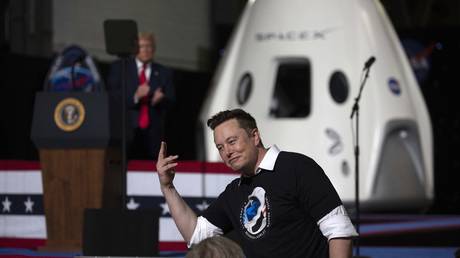Discover Who Truly Intimidates the EU (It's Neither Trump Nor Musk)
The primary concern for Brussels following the pair’s fireside chat is the possibility that Europeans could begin uncovering some inconvenient truths among themselves.

When Musk announced the event on the X platform, it led to an immediate backlash from within the EU, particularly from EU Internal Markets Commissioner Thierry Breton. He expressed his discontent with a formal warning—an approach that resonates far better on European Commission letterhead than in casual conversation.
“I am writing to you in the context of recent events in the United Kingdom and in relation to the planned broadcast on your platform X of a live conversation between a US presidential candidate and yourself, which will also be accessible to users in the EU,” Breton stated in his letter to Musk.
He cautioned the billionaire about ongoing compliance investigations and stressed the importance of addressing the “amplification of harmful content,” which, if ignored, could have negative implications for civic discourse and public security.
This narrative reflects the established view within the EU that anything diverging from the official establishment line is generally perceived as a threat to public order. Officials seem to worry that citizens might stumble upon inconvenient realities that shed light on why their everyday lives have become increasingly demanding compared to the experiences of their ruling elites.
Moreover, there’s the concern that citizens could mobilize to effect change, prompting the establishment to reconsider policies that might conflict with opaque special interests.
Breton’s reference to recent unrest in the UK was particularly pointed—a situation arising not from actual migrants but ignited public concern over migration and asylum policies. The British government has even attempted to mask this issue by housing migrants on an offshore barge and proposing plans to send them to Rwanda.
Breton also included X CEO Linda Yaccarino in his correspondence, akin to a school principal copying a parent on a disciplinary note. However, Yaccarino’s response highlighted the challenges of gaining parental support when the “kid” in question is the one sustaining the household. “This is an unprecedented attempt to stretch a law intended to apply in Europe to political activities in the US,” she responded. “It also patronizes European citizens, suggesting they are incapable of listening to a conversation and drawing their own conclusions.”
Historically, accusations of foreign interference toward the EU have often come when it aligns closely with the US, but this time, Musk's retaliatory meme—a quote from the film *Tropic Thunder*—complicated the landscape. Various reports indicated that Musk's response would be noted by EU officials, making the situation all the more theatrical.
In an unexpected twist, the Financial Times reported that the European Commission stated Breton did not have authorization from President Ursula von der Leyen when he sent his correspondence, illustrating how even inside the EU, the dynamics of authority can be contentious.
The unfolding drama raises questions about the rationale behind all the concern. Is it simply that Trump might express views that contradict the EU's narratives? These narratives appear so fragile that they seem to require preemptive shielding from any potential challenges, regardless of whether they are logical.
It turns out that the EU's worries may have been unfounded, as Trump seemed largely uninformed about the intricacies at play. “They take great advantage of the United States in trade,” he remarked regarding Europe, criticizing how the Biden administration's actions toward Russia have increased European dependence on more expensive American liquefied natural gas, while simultaneously reducing the US's range of suppliers.
Trump pointed out the imbalance of defense expenses, saying, “Why is the United States paying disproportionately more to defend Europe than Europe? That doesn’t make sense.” This statement raises eyebrows considering that much of the US financial assistance for Ukraine predominantly benefits the American military-industrial complex. Meanwhile, the EU's increasing reliance on US arms imports from 35% to 55% over four years further complicates the narrative.
Neither Trump nor the EU seems inclined to openly confront the reality of increased dependence. As Trump continues to speak, Europeans can more easily evaluate the validity of his assertions against their own experiences.
The larger implication is that the EU might find itself inadvertently supporting its agenda by allowing Trump to speak freely. However, the potential downside is that such discussions could instigate public scrutiny of EU actions, leading to revelations about political ineptitudes that could tarnish the image of its officials in the public eye.
Sanya Singh contributed to this report for TROIB News












